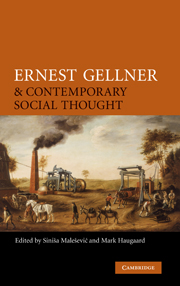Book contents
- Frontmatter
- Contents
- Notes on contributors
- Acknowledgements
- Introduction: an intellectual rebel with a cause
- Part I Civil society, coercion and liberty
- 1 Ernest Gellner on liberty and modernity
- 2 Predation and production in European imperialism
- 3 Power, modernity and liberal democracy
- 4 Gellner versus Marxism: a major concern or a fleeting affair?
- Part II Ideology, nationalism and modernity
- Part III Islam, postmodernism and Gellner's metaphysic
- Index
- References
2 - Predation and production in European imperialism
Published online by Cambridge University Press: 22 September 2009
- Frontmatter
- Contents
- Notes on contributors
- Acknowledgements
- Introduction: an intellectual rebel with a cause
- Part I Civil society, coercion and liberty
- 1 Ernest Gellner on liberty and modernity
- 2 Predation and production in European imperialism
- 3 Power, modernity and liberal democracy
- 4 Gellner versus Marxism: a major concern or a fleeting affair?
- Part II Ideology, nationalism and modernity
- Part III Islam, postmodernism and Gellner's metaphysic
- Index
- References
Summary
Introduction: a defence of the European Miracle (and of Ernest Gellner) – in Europe
In the first and second volumes of The Sources of Social Power I gave an account of ‘the European Miracle’ which owed a considerable personal debt to Ernest Gellner – and also to John Hall, through our LSE Seminar Series ‘Patterns of History’. There we invited eminent scholars, experts on a great range of societies in time and place, to speak on the major issues of their field. We did this in order to pillage knowledge from them which would be useful in our own budding theories of social development. I greatly admired my two colleagues' abilities to cut to the chase of major issues, especially John through his incisive questioning and Ernest through his theory-rich one-liners. Over the 1980s Ernest, John and I then gave overlapping accounts of the ‘European Miracle’ in which we argued that the essential breakthrough to modernity came in Western Europe, and that its origins and dynamic lay deep-rooted in the continent (Gellner 1988; Hall 1986; Mann 1986). So also did Jean Baechler, with whom we collaborated in a book (Hall et al. 1988), and so have economic historians like Ernest Jones (1987) and David Landes (1998).
Since the 1990s this viewpoint has been attacked by economic historians styling themselves as ‘anti-Orientalists’, especially Kenneth Pomerantz (2000), Bin Wong (1997) and André Gunder Frank (1998), buttressed by demographers (Lee and Cameron 1997; Lee and Feng, 1999) and sociologists (Goldstone 2002; Hobson 2004).
- Type
- Chapter
- Information
- Ernest Gellner and Contemporary Social Thought , pp. 50 - 74Publisher: Cambridge University PressPrint publication year: 2007
References
- 7
- Cited by

